Media-savvy business professors look beyond the lecture hall
Financial Times – From YouTube and TV to podcasts, academics are building on the shift to online teaching
From YouTube and TV to podcasts, academics are building on the shift to online teaching

In his imagination, Bertrand Monnet could see it all: a drone hovers above the French campus of Edhec business school, then takes the viewer into the classroom, where the professor of criminal risks management is showing students how the criminal economy equates to 3 per cent of global gross domestic product. His infographics come alive, inviting the viewer to step through the slides and into a conversation in Mexico between Monnet and a member of the Sinaloa drug cartel.
It is a powerful idea, and one that Prof Monnet turned into reality in the form of two 70-minute documentaries (Le Business du Crime), co-produced by CinéFrance Studios and KM and broadcast on French television channel RMC Story this year.
“For viewers, the documentaries are like taking students on a field trip,” he says. “It’s all based on the case study pedagogy here at Edhec. On a subject like the business of crime, there are many textbooks that are essential, but not sufficient. It’s important to hear from the criminals how they choose their targets or how they launder their money. It shows the reality and is so much more impactful.”
Edhec is fully behind his efforts to take his teaching to a wider audience, says Prof Monnet. He has written on the crime business for French newspapers and magazines Le Monde, L’Express and L’Expansion and made another documentary on Somali pirates for French channel Canal+ in 2016.
“I’ve been published in academic journals before, but my dean has agreed that my features and documentaries can also be considered as part of my publishing output, because it brings something extra to the business school.”
Prof Monnet urges other academics to follow his lead. “If you think you can turn your class into a story, just dare to do it,” he says. He also wants to explore using virtual reality to take viewers deeper into the criminal underworld.
The switch to online learning during the pandemic has made many academics more comfortable with taking their expertise and interests outside the lecture theatre. While a decade ago the makers of Moocs (massive online open courses) promised to turn professors into celebrities, digital-savvy academics now see that they can do it for themselves, through their own media channels.
Some, like Oluwasoye Mafimisebi, senior lecturer in strategic management at De Montfort University’s Leicester Castle Business School in central England, used YouTube to help students through the pandemic. The lectures he uploads to his channel, YouTube Professor, have received more than 20,000 views. And a YouTube channel of finance lectures by David Hillier, executive dean of the University of Strathclyde Business School in Scotland, has attracted more than half a million views.
Others favour podcasts. “We need academic influencers,” says Alberto Alemanno, a professor at HEC Paris, host of the Citizen Lobbyist podcast and founder of The Good Lobby, a non-profit that helps citizens and other organisations counter the influence of special interest groups.
“But we academics are not trained for engagement with the public at large. It’s not even what most universities expect us to do. By narrating the stories of individuals lobbying for good, my podcast aims to inspire our students and other listeners to play their part in today’s most controversial challenges facing our societies.”
An early Mooc professor on Coursera back in 2014, Prof Alemanno has since experimented with a variety of formats and hopes to create a dedicated media channel.
“Academics have all that’s needed to become trusted voices in today’s polarised discourse. They have a moral duty to try to go beyond the ivory towers and engage with the public beyond the classroom.”
In Italy, MIP Politecnico di Milano School of Management professors Antonella Moretto and Davide Chiaroni co-host Innovators’ Talks, a podcast in which they interview entrepreneurs, managers and chief executives twice a month. Backed by Forbes Italia magazine, the podcast was first proposed by one of their executive MBA alumni, who had launched a digital audio business.
“Following the rollout, we were contacted by Forbes, who were interested in a partnership and in sharing our podcasts on their channels,” says Prof Moretto, who adds that the podcast allows students to hear stories of innovation from different fields. “Through the podcast, you learn innovation without realising that you are learning something new.”
She admits that making podcasts is very different from what business school academics are used to — from the short lead time and importance of straight-talking to the informal nature of the conversations. “I’d recommend finding a reliable partner,” she suggests. “Podcasts aren’t something you can improvise, but need expertise to be effective. You also need to be in love with the topic and it helps if the school is recognised for the topic — it makes it much easier to attract good speakers and gain listeners.”
Philipp Sandner, head of Frankfurt School of Finance and Management’s Blockchain Centre in Germany, hosts a popular podcast on the technology. “I wanted to learn more myself,” he says. “People learn when they talk to other skilled people, so I thought to myself: why not ask other people questions, learn from it, record it and put it online?”
Prof Sandner enjoys the pressure of the weekly deadline. “I appreciate the just-do-it mentality of creating a podcast,” he says. “Recording the podcast takes 45 minutes, while cutting and uploading takes another 15 minutes. So, with just one hour of investment per week, we reach 5,000 people — it is much more efficient than writing academic papers.”